Unit 10 You're supposed to shake hands.Period 1(Section A 1a-2d)课件(共15张PPT)
文档属性
| 名称 | Unit 10 You're supposed to shake hands.Period 1(Section A 1a-2d)课件(共15张PPT) | 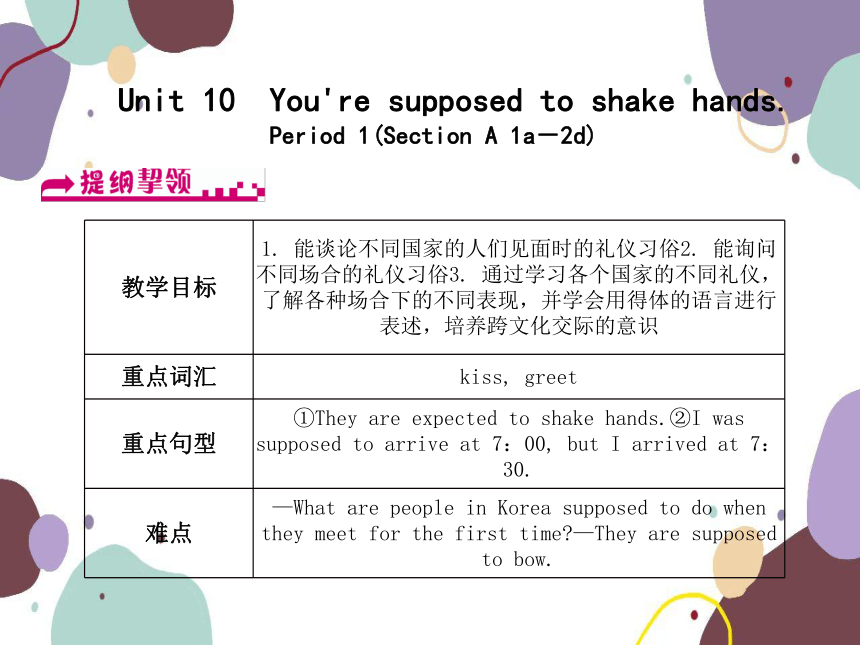 | |
| 格式 | pptx | ||
| 文件大小 | 227.3KB | ||
| 资源类型 | 教案 | ||
| 版本资源 | 人教新目标(Go for it)版 | ||
| 科目 | 英语 | ||
| 更新时间 | 2022-10-18 14:00:38 | ||
图片预览

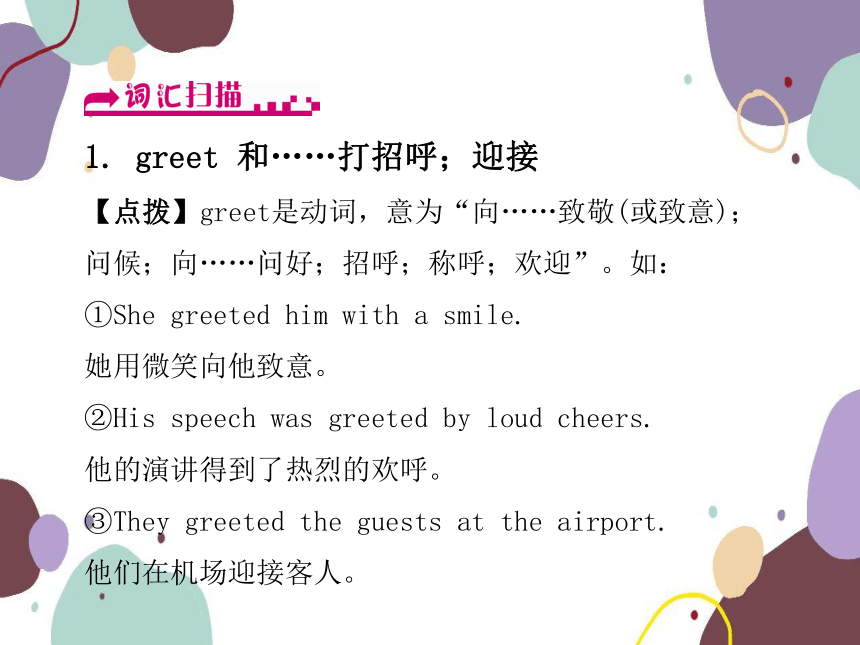
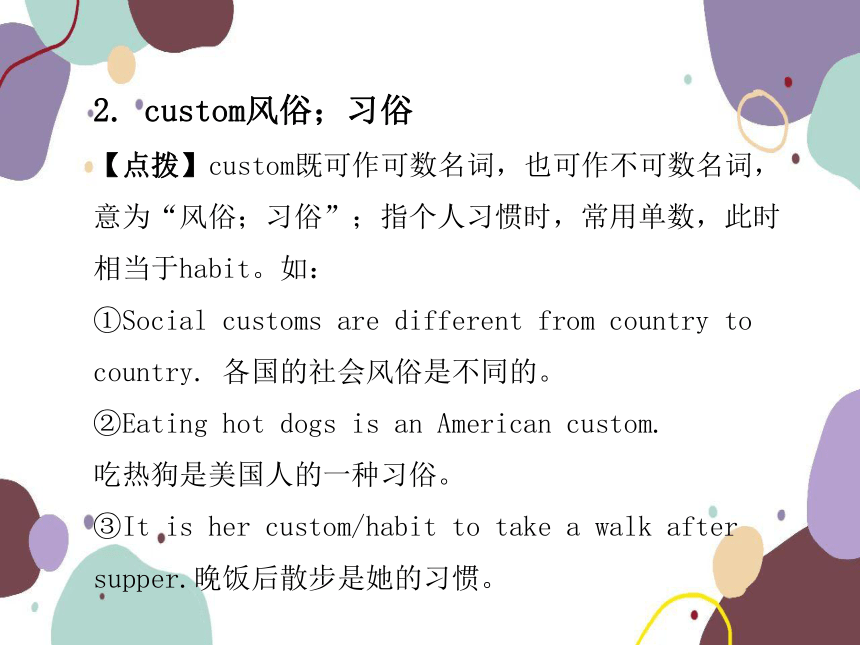
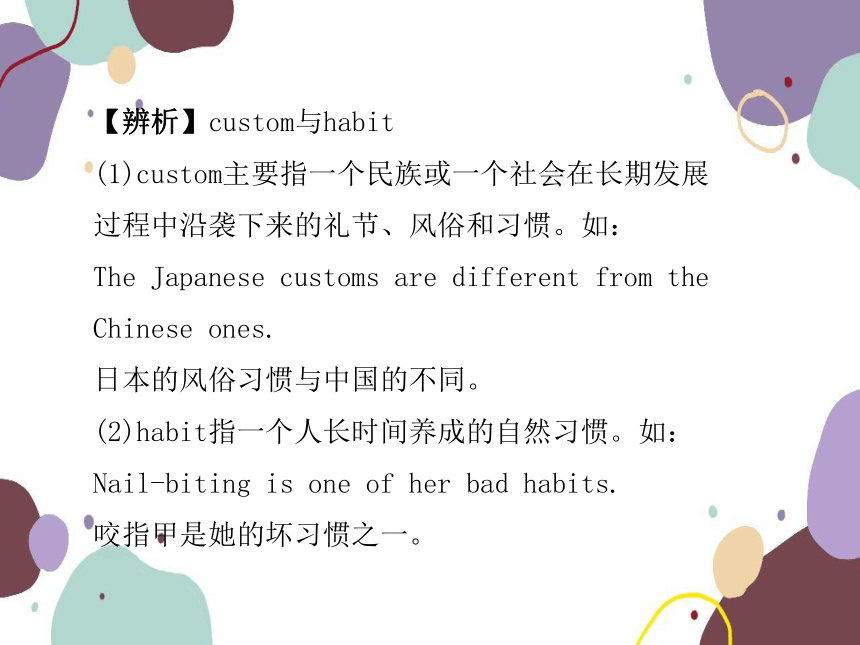
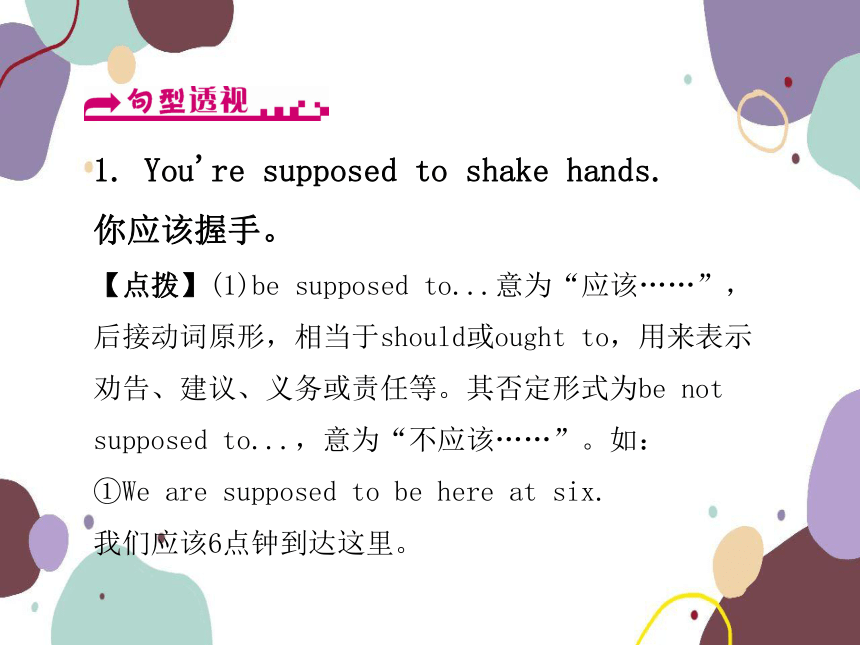
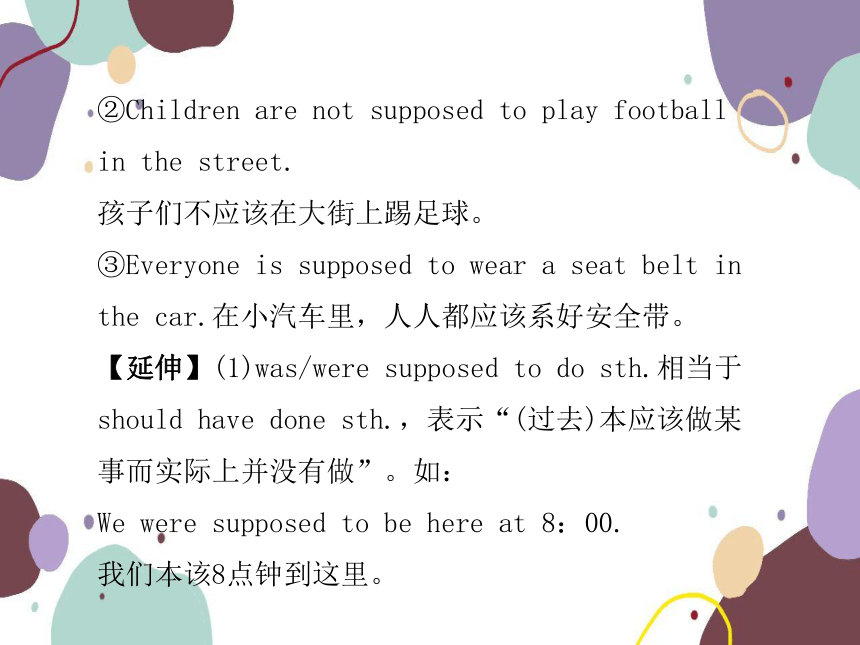
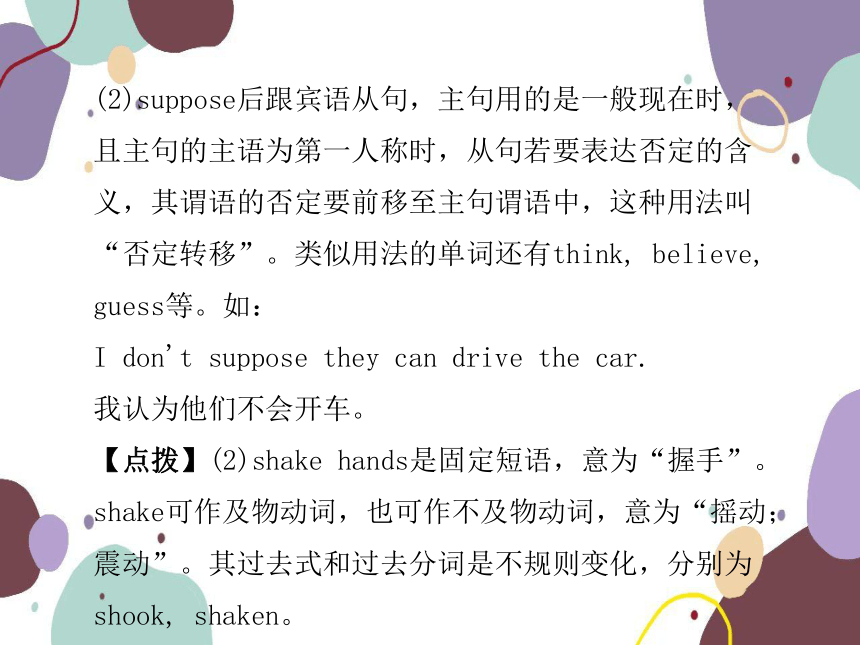
文档简介
(共15张PPT)
Unit 10 You're supposed to shake hands.
Period 1(Section A 1a-2d)
教学目标 1. 能谈论不同国家的人们见面时的礼仪习俗2. 能询问不同场合的礼仪习俗3. 通过学习各个国家的不同礼仪,了解各种场合下的不同表现,并学会用得体的语言进行表述,培养跨文化交际的意识
重点词汇 kiss, greet
重点句型 ①They are expected to shake hands.②I was supposed to arrive at 7:00, but I arrived at 7:30.
难点 —What are people in Korea supposed to do when they meet for the first time —They are supposed to bow.
1. greet 和……打招呼;迎接
【点拨】greet是动词,意为“向……致敬(或致意);问候;向……问好;招呼;称呼;欢迎”。如:
①She greeted him with a smile.
她用微笑向他致意。
②His speech was greeted by loud cheers.
他的演讲得到了热烈的欢呼。
③They greeted the guests at the airport.
他们在机场迎接客人。
2. custom风俗;习俗
【点拨】custom既可作可数名词,也可作不可数名词,意为“风俗;习俗”;指个人习惯时,常用单数,此时相当于habit。如:
①Social customs are different from country to country. 各国的社会风俗是不同的。
②Eating hot dogs is an American custom.
吃热狗是美国人的一种习俗。
③It is her custom/habit to take a walk after supper.晚饭后散步是她的习惯。
【辨析】custom与habit
(1)custom主要指一个民族或一个社会在长期发展过程中沿袭下来的礼节、风俗和习惯。如:
The Japanese customs are different from the Chinese ones.
日本的风俗习惯与中国的不同。
(2)habit指一个人长时间养成的自然习惯。如:
Nail-biting is one of her bad habits.
咬指甲是她的坏习惯之一。
1. You're supposed to shake hands.
你应该握手。
【点拨】(1)be supposed to...意为“应该……”,后接动词原形,相当于should或ought to,用来表示劝告、建议、义务或责任等。其否定形式为be not supposed to...,意为“不应该……”。如:
①We are supposed to be here at six.
我们应该6点钟到达这里。
②Children are not supposed to play football in the street.
孩子们不应该在大街上踢足球。
③Everyone is supposed to wear a seat belt in the car.在小汽车里,人人都应该系好安全带。
【延伸】(1)was/were supposed to do sth.相当于should have done sth.,表示“(过去)本应该做某事而实际上并没有做”。如:
We were supposed to be here at 8:00.
我们本该8点钟到这里。
(2)suppose后跟宾语从句,主句用的是一般现在时,且主句的主语为第一人称时,从句若要表达否定的含义,其谓语的否定要前移至主句谓语中,这种用法叫“否定转移”。类似用法的单词还有think, believe, guess等。如:
I don't suppose they can drive the car.
我认为他们不会开车。
【点拨】(2)shake hands是固定短语,意为“握手”。shake可作及物动词,也可作不及物动词,意为“摇动;震动”。其过去式和过去分词是不规则变化,分别为shook, shaken。
如:
He shook his head sadly.
他难过地摇了摇头。
【延伸】shake hands with sb./shake sb. by the hand意为“与某人握手”,而shake one's hand则指“握某人的手”,强调一方的动作,故hand用单数。如:
She shook the boy's hand and patted him on the head lightly.
她握了握那个男孩的手,并轻轻地拍了一下他的头。
2. I arrived late. 我迟到了。
【辨析】arrive, reach与get to
三者都意为“到达”,其区别如下:
(1)arrive+in+大地方(国家、城市等);arrive+at+小地方(村庄、车站、码头等)。arrive还可以不接地点,独立使用。
(2)get to+地点名词。
(3)reach+地点名词。如:
①When did you get to the station yesterday 你昨天什么时候到达车站的?
②He arrived in Nanning last week.
他上个星期到的南宁。
③Please send me a short message when you reach Beijing.
当你到北京的时候,请发短信给我。
④Tony was the first one to arrive.
托尼是第一个到的。
【注意】当reach, arrive, get后接地点副词here, there, home时,不能接任何介词。
3. But a funny thing happened.
但发生了一件有趣的事情。
【辨析】funny与fun
(1)funny是形容词,意为“有趣的;滑稽可笑的;爱开玩笑的”,侧重点是让人觉得好玩、滑稽可笑。如:
The story is very funny.
这个故事非常滑稽可笑。
(2)fun作形容词时,意为“有趣的;愉快的”,强调有趣、好玩;作名词时,意为“娱乐;乐趣”,为不可数名词。如:
①We had a fun night.
我们度过了一个愉快的夜晚。(fun作形容词)
②What fun they have!
他们玩得多高兴呀!(fun作名词)
【点拨】happen作不及物动词,其用法如下:
(1)“sth. happen+时间/地点”意为“某时/某地发生了某事”。如:
An accident happened in our neighborhood just now.刚才在我们社区里发生了一起事故。
(2)sth. happen to sb.意为“某人发生了某事”。如:Please tell me if anything happened to him 请告诉我他是不是发生了什么事?
(3)sb. happen to do sth.意为“某人碰巧做某事”。如:He happened to come in while we were talking about him.我们正在谈论他的时候,他刚好走了进来。
【注意】happen为不及物动词,不能用于被动语态。如:
The story happened last week. (正)
这个故事发生在上周。
The story was happened last week. (误)
【辨析】happen与take place
(1)happen意为“(偶然)发生”,可用来指某个事件突然发生,强调偶然性,主语往往是表示事件、事故等的名词。
如:
If anything happens to the machine, please let me know.
如果机器出了什么问题,请通知我。
(2)take place意为“发生;举行”,常指某事按规律、预先布置或按计划发生或进行,尤指“举行”,不含偶然的意味。如:
The meeting will take place on Monday afternoon.
会议将于星期一下午举行。
Unit 10 You're supposed to shake hands.
Period 1(Section A 1a-2d)
教学目标 1. 能谈论不同国家的人们见面时的礼仪习俗2. 能询问不同场合的礼仪习俗3. 通过学习各个国家的不同礼仪,了解各种场合下的不同表现,并学会用得体的语言进行表述,培养跨文化交际的意识
重点词汇 kiss, greet
重点句型 ①They are expected to shake hands.②I was supposed to arrive at 7:00, but I arrived at 7:30.
难点 —What are people in Korea supposed to do when they meet for the first time —They are supposed to bow.
1. greet 和……打招呼;迎接
【点拨】greet是动词,意为“向……致敬(或致意);问候;向……问好;招呼;称呼;欢迎”。如:
①She greeted him with a smile.
她用微笑向他致意。
②His speech was greeted by loud cheers.
他的演讲得到了热烈的欢呼。
③They greeted the guests at the airport.
他们在机场迎接客人。
2. custom风俗;习俗
【点拨】custom既可作可数名词,也可作不可数名词,意为“风俗;习俗”;指个人习惯时,常用单数,此时相当于habit。如:
①Social customs are different from country to country. 各国的社会风俗是不同的。
②Eating hot dogs is an American custom.
吃热狗是美国人的一种习俗。
③It is her custom/habit to take a walk after supper.晚饭后散步是她的习惯。
【辨析】custom与habit
(1)custom主要指一个民族或一个社会在长期发展过程中沿袭下来的礼节、风俗和习惯。如:
The Japanese customs are different from the Chinese ones.
日本的风俗习惯与中国的不同。
(2)habit指一个人长时间养成的自然习惯。如:
Nail-biting is one of her bad habits.
咬指甲是她的坏习惯之一。
1. You're supposed to shake hands.
你应该握手。
【点拨】(1)be supposed to...意为“应该……”,后接动词原形,相当于should或ought to,用来表示劝告、建议、义务或责任等。其否定形式为be not supposed to...,意为“不应该……”。如:
①We are supposed to be here at six.
我们应该6点钟到达这里。
②Children are not supposed to play football in the street.
孩子们不应该在大街上踢足球。
③Everyone is supposed to wear a seat belt in the car.在小汽车里,人人都应该系好安全带。
【延伸】(1)was/were supposed to do sth.相当于should have done sth.,表示“(过去)本应该做某事而实际上并没有做”。如:
We were supposed to be here at 8:00.
我们本该8点钟到这里。
(2)suppose后跟宾语从句,主句用的是一般现在时,且主句的主语为第一人称时,从句若要表达否定的含义,其谓语的否定要前移至主句谓语中,这种用法叫“否定转移”。类似用法的单词还有think, believe, guess等。如:
I don't suppose they can drive the car.
我认为他们不会开车。
【点拨】(2)shake hands是固定短语,意为“握手”。shake可作及物动词,也可作不及物动词,意为“摇动;震动”。其过去式和过去分词是不规则变化,分别为shook, shaken。
如:
He shook his head sadly.
他难过地摇了摇头。
【延伸】shake hands with sb./shake sb. by the hand意为“与某人握手”,而shake one's hand则指“握某人的手”,强调一方的动作,故hand用单数。如:
She shook the boy's hand and patted him on the head lightly.
她握了握那个男孩的手,并轻轻地拍了一下他的头。
2. I arrived late. 我迟到了。
【辨析】arrive, reach与get to
三者都意为“到达”,其区别如下:
(1)arrive+in+大地方(国家、城市等);arrive+at+小地方(村庄、车站、码头等)。arrive还可以不接地点,独立使用。
(2)get to+地点名词。
(3)reach+地点名词。如:
①When did you get to the station yesterday 你昨天什么时候到达车站的?
②He arrived in Nanning last week.
他上个星期到的南宁。
③Please send me a short message when you reach Beijing.
当你到北京的时候,请发短信给我。
④Tony was the first one to arrive.
托尼是第一个到的。
【注意】当reach, arrive, get后接地点副词here, there, home时,不能接任何介词。
3. But a funny thing happened.
但发生了一件有趣的事情。
【辨析】funny与fun
(1)funny是形容词,意为“有趣的;滑稽可笑的;爱开玩笑的”,侧重点是让人觉得好玩、滑稽可笑。如:
The story is very funny.
这个故事非常滑稽可笑。
(2)fun作形容词时,意为“有趣的;愉快的”,强调有趣、好玩;作名词时,意为“娱乐;乐趣”,为不可数名词。如:
①We had a fun night.
我们度过了一个愉快的夜晚。(fun作形容词)
②What fun they have!
他们玩得多高兴呀!(fun作名词)
【点拨】happen作不及物动词,其用法如下:
(1)“sth. happen+时间/地点”意为“某时/某地发生了某事”。如:
An accident happened in our neighborhood just now.刚才在我们社区里发生了一起事故。
(2)sth. happen to sb.意为“某人发生了某事”。如:Please tell me if anything happened to him 请告诉我他是不是发生了什么事?
(3)sb. happen to do sth.意为“某人碰巧做某事”。如:He happened to come in while we were talking about him.我们正在谈论他的时候,他刚好走了进来。
【注意】happen为不及物动词,不能用于被动语态。如:
The story happened last week. (正)
这个故事发生在上周。
The story was happened last week. (误)
【辨析】happen与take place
(1)happen意为“(偶然)发生”,可用来指某个事件突然发生,强调偶然性,主语往往是表示事件、事故等的名词。
如:
If anything happens to the machine, please let me know.
如果机器出了什么问题,请通知我。
(2)take place意为“发生;举行”,常指某事按规律、预先布置或按计划发生或进行,尤指“举行”,不含偶然的意味。如:
The meeting will take place on Monday afternoon.
会议将于星期一下午举行。
同课章节目录
- Unit 1 How can we become good learners.
- Section A
- Section B
- Unit 2 I think that mooncakes are delicious!
- Section A
- Section B
- Unit 3 Could you please tell me where the restroom
- Section A
- Section B
- Unit 4 I used to be afraid of the dark.
- Section A
- Section B
- Unit 5 What are the shirts made of?
- Section A
- Section B
- Review of Units 1-5
- Unit 6 When was it invented?
- Section A
- Section B
- Unit 7 Teenagers should be allowed to choose their
- Section A
- Section B
- Unit 8 It must belong to Carla.
- Section A
- Section B
- Unit 9 I like music that I can dance to.
- Section A
- Section B
- Unit 10 You're supposed to shake hands.
- Section A
- Section B
- Review of Units 6-10
- Unit 11 Sad movies make me cry.
- Section A
- Section B
- Unit 12 Life is full of the unexpected
- Section A
- Section B
- Unit 13 We're trying to save the earth!
- Section A
- Section B
- Unit 14 I remember meeting all of you in Grade 7.
- Section A
- Section B
- Review of Units 11-14
